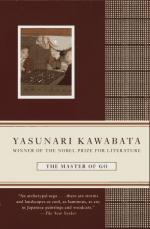|
This section contains 5,048 words (approx. 17 pages at 300 words per page) |

|
SOURCE: "Tragic Vision in Kawabata's The Master of Go," in Rocky Mountain Review of Language and Literature, Vol. 36, No. 2, 1982, pp. 83-94.
In the following essay, Bourque analyzes Kawabata's The Master of Go as a modern tragedy.
At first glance the application of the thoroughly Western dramatic concept of tragedy to an Oriental novel may seem to be critical madness. Both the genres and the traditions are jarringly incongruous: the process may seem a bit like trying to examine a flower with a sword. Yet, unlike most Japanese novels, The Master of Go seems to invite examination from the perspective of Western concepts. At its most accessible symbolic level the novel presents the Go match between the old Master, Shusai, and the young challenger, Otaké, as the objectification of a conflict between tradition and change in Japanese culture, a change intimately associated with Western ideas. Beyond that, the most...
|
This section contains 5,048 words (approx. 17 pages at 300 words per page) |

|


